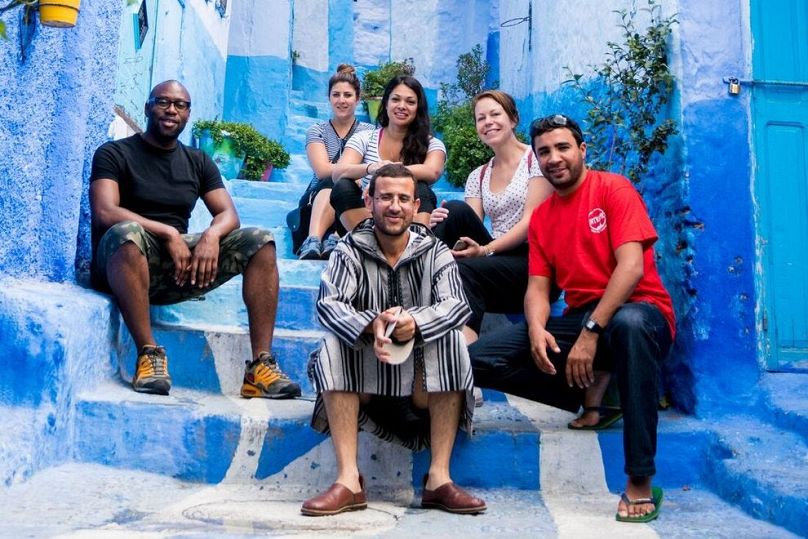Our Managing Editor brings you an announcement following a declaration announced at COP26 yesterday.
Today marks a new era for Euronews Travel. From today, we are focussing on travel businesses, organisations and destinations that are trying to manage their impact on the climate.
This can mean many things, of course. But in this case it means organisations who have signed up to the Glasgow Declaration for Climate Action in Tourism. This was launched yesterday at COP26 and the quickest way to understand it is to watch the video above.
What is our pledge and how will it change our work?
We will continue to report travel news as it happens. But in other sections, like Destinations, Stays and Experiences, we’ll be prioritising stories from organisations who have signed up to the Glasgow Declaration.
There are more than 300 signatories so far so we won’t be short of stories to bring you.
It won’t change the quality of stories on our website and social media. You’ll continue to see inspiring, colourful and beautiful destinations that you’ll definitely want to add to your bucket list.
This commitment will run until the end of 2021 and maybe beyond. The pledge is also being taken by our sister verticals Euronews Green and Euronews Next.
Why are we doing this?
I am also the Editor of Euronews Green, our environment and climate vertical, and I have seen many declarations and pledges come and go over the years. All the while, greenhouse gas emissions have continued to rise along with all the consequences, such as heatwaves and devastating flooding.
But, so far at least, the Glasgow Declaration seems like it really could bring down emissions - the priority if we are going to avoid 1.5C.
We also recognise that there are many travel destinations that simply can’t afford not to bring down their emissions because their economies are so dependent on tourism. We have all seen the impact of COVID-19 on these types of destinations. Reducing emissions now could mean they don’t have to face another years-long pause in tourism.
What does signing up to the Glasgow Declaration actually mean?
The Glasgow Declaration provides an answer to a question that travel companies have been asking for years: how do we keep serving our customers without destroying the destinations they’re travelling to?
It provides a clear plan to limit climate impact. As one attendee at a launch event said yesterday, “I am so inspired and no longer feel isolated as a small tour operator.”
By signing up, signatories commit to do things which we know to be crucial for businesses to bring down their emissions:
Measure and report emissions
Decarbonise in all areas of business (with carbon offsetting only playing a secondary role)
Regenerate and protect ecosystems
Collaborate with others
Properly finance their progress
How signatories actually decarbonise is up to them. As an example, the West Sweden Tourist Board doesn't market their region outside of Europe anymore, so that they’re not encouraging long-haul flying. Tourist attractions have reduced the size of their car parks, sending a strong signal to visitors to travel in a less carbon intensive way than driving.
This just shows that there is no one size fits all approach to limiting emissions. But sharing challenges and solutions across the travel industry is key, as is working together. Destinations may be competing for business from travellers. But they all ultimately share one planet.
Who are the signatories that we’ll be giving coverage to?
The list of signatories is really varied so you’ll see stories about a wide variety of places. It includes huge companies like Accor, who have 250,000 employees, and much-loved tropical destinations like Barbados and Panama.
It also includes companies like Intrepid, Saddle Skedaddle and Much Better Adventures who we have featured before.
The full list of signatories is here.
What can you do to be a more eco-conscious traveller?
Like many of you, I have been a lifelong traveller. Travel has expanded my mind, led me to lifelong friends and provided a much-needed break from work and daily life. None of us want to stop travelling. But the need to manage our impact on the Earth, in all areas of our lives, is now imperative.
By choosing to travel with companies who have signed up to this declaration, you’ll be managing your own carbon footprint.
We all have to be more responsible in how we travel. Here's a few tips:
- If you’re going to take a long-haul flight, make it a longer trip rather than taking lots of short trips.
- Consider whether you really need to go back to the amount of business travel you were doing pre-pandemic.
- Long distance train travel is booming right now, and becoming a more comfortable, quick and seamless experience. So consider trains over flights, especially for domestic travel.
- Locally-owned and run accommodation, such as guesthouses and homestays, have smaller carbon footprints than big hotels. They also have a vested interest in protecting the local area because they live there long-term. What’s more, the owners can give you insider tips on the best things to do in the area and hook you up with local experiences.
- Eating a plant-based diet and not driving are two of the biggest ways to cut your carbon footprint so you may want to do these while travelling.
- Even when you’re travelling, don’t forget to do all the eco-conscious things you do at home, like recycling, carrying a reusable water bottle (especially important when you’re drinking more in a hot climate) and keeping showers short to conserve water.
There are many more ways to travel responsibly, of course. But a guiding principle to follow might be: treat your destination as you would your own home or local area.













